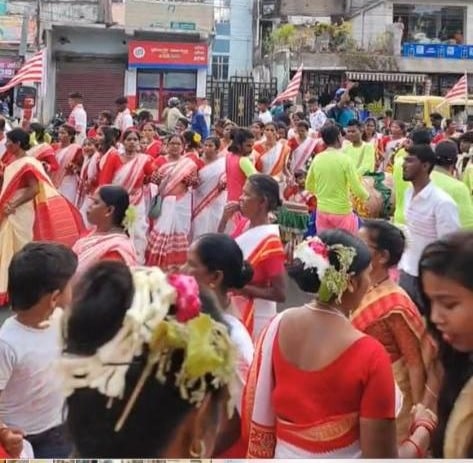

Most tribal communities celebrated the annual Sarhul festival with pomp and show in Jharkhand on Friday.
All government offices are closed as a holiday. The shops and marketplaces remained shut in Ranchi and adjoining areas of the state as the state administration has declared all main roads leading to the centre of the city- Elbert Ekka Chowk as a “free zone” where vehicles were not allowed to move.
It is on these roads, Shobha Yatras are being taken out by tribal communities whose men, women and children were spotted moving in groups, each in colourful dress, dancing and singing. The Sobha yatras remained peaceful as police personnel were deployed across the city in full strength.

As it is, Sarhul day is the beginning of their new year. This festival commences on the third day of Chaitra (the first month of the Hindu calendar) month and involves three days of festivities relating to the worship of the Sal tree. The Sal, wood used to build homes, has been considered by tribals as the abode of the deity “Sarna” who protects the village from all kinds of natural calamities and disasters.
The Sal tree is also called Jaher which means the sacred grove and the festival takes place when the tree gets new leaves and flowers. 'Sar' refers to the year and 'Hul' means set to begin.
Sarhul is one of the most popular festivals of Jharkhand that commemorate the beginning of the year. It is celebrated by various tribal communities such as Oraon, Munda and Ho that observe the festival by thanking nature for providing them with shelter, livelihood, food and drink.
In Ranchi, the capital city of Jharkhand, the centre of the Sarna festival is Hatma where Pahan( priest) Jaglal Pahan performed rituals of worship connected with the Sarna deity on Thursday- Friday night. Five roosters- hen were sacrificed.

Traditionally, like in previous years, Pahan saw the water in earthen and placed it toward its south side and thereafter he predicted normal rain, especially in Southern areas of the state during the coming monsoon season.
Pahan told JharkhandStateNews.com explained the importance of sacrificing five rooster- hens on the annual Sarhul puja.” The sacrifice coloured(Ranguwa) hen is made for the village god; garland( Mala) hen for rivers and ponds( water bodies); decorated(Rangli) hen for ancestors; black hen for peace of the departed bad souls; and white rooster for the creator of the universe.